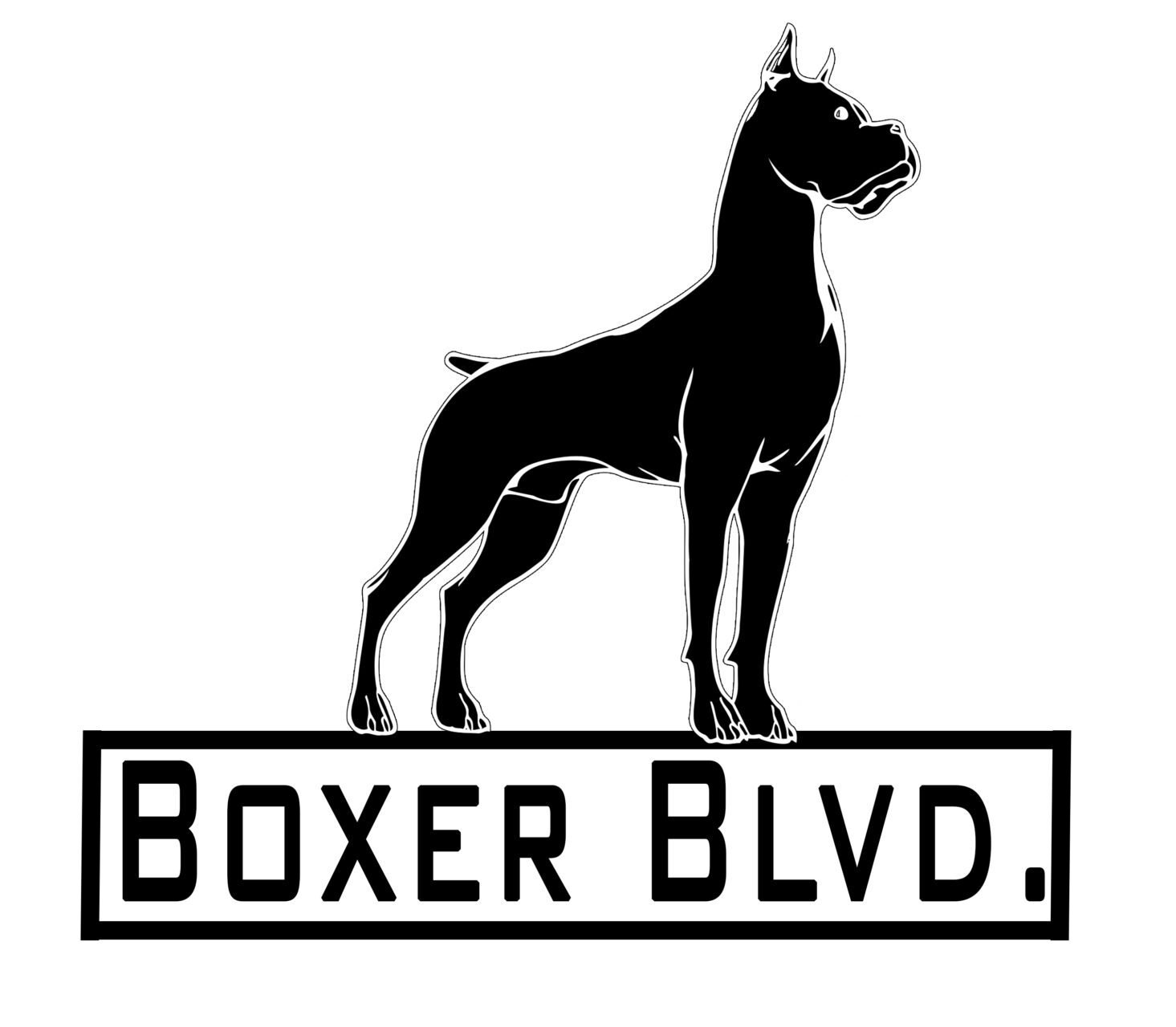FAQ
Common Questions About Boxers
-
What Do I Need to Know About Boxers?
Developed in Germany in the 19th century, Boxers were used for dog fighting and to run down and hold large game such as wild boar and bison. The breed is known for standing up on its hind legs and batting its opponent, appearing to box with its paws. They were imported to America after World War 1. They began to grow in popularity in the late 1930s to early 1940s after Soldiers that had been stationed overseas brought back Boxers ,when they were returning home!! With a strong sleek appearance ,yet having a friendly personality the Boxer soon became known as a guard dog ,and a family companion!
-
Is a Boxer the Right Pet For Me?
A Boxer is a high energy dog and loves human companionship ,they need a large fenced of area so they can run their energy off! If that is not an option a long walk once a day minimum, but twice would be recommended. When you leave your Boxer home alone you should have some toys for him or small companion toys!
-
What temperament does a Boxer have?
Boxers are strong, loving, energetic, and protective dogs with a love for human attention. They are excellent with children. They were ranked the 7th most popular dog in the American Kennel Club in 2012 and 2013 due to there good looks and lovable personality.
-
Do Boxers tend to bark a lot?
Boxers tend to bark if they get bored and aren't getting enough exercise. If a Boxer bites this is totally abnormal behavior. It may be because the dog is in pain and cannot cope with it. Aggressive behavior is the 2nd most common symptom that a dog displays when in pain.
-
What about grooming my Boxer?
Your Boxer should not need a bath more than twice a month they have a short shiny hair-coat and excessive bathing tends to make their skin dry and itchy. Ears should be cleaned every time you give them a bath, once or twice a month! Nails have to be trimmed every 6 - 8 weeks if they're in the house on regular basis. Brushing your dog on a regular basics will help reduce shedding.
-
How big do Boxers get?
Boxers generally stand 20'' - 25'' at the shoulder and weigh 50 - 85 lbs. Males generally get bigger than females. A well conditioned Boxer is an awesome sight. Their muscles ripple beneath their short, tight fitting coat.
-
What about house-training my Boxer?
Commonly the Boxer is very easy to house-training due to the fact that its a clean dog. House-training is all about consistency. A young puppy has to go more often then does a mature Boxer. When they wake up, take them outside to a certain spot and use the same command until they are trained.
-
When can I start training my Boxer puppy?
Right away! An 8 week old puppy is quite capable of starting to learn basic commands such as sit, down, come, and to fetch. Remember to keep training sessions very short though, as puppy attention spans are fleeting, and to use only positive reward-based training methods. Training should be fun, for you and your puppy! By 10-16 weeks, your puppy is ready to attend his first puppy kindergarten class and every attempt should be made to do so – it is a great socialization and learning opportunity for your puppy.
Common Questions About Boxers
-
What do I need to know about Boxers?
Developed in Germany in the 19th century, Boxers were used for dog fighting and to run down and hold large game such as wild boar and bison. The breed is known for standing up on its hind legs and batting its opponent, appearing to box with its paws. They were imported to America after World War 1. They began to grow in popularity in the late 1930s to early 1940s after Soldiers that had been stationed overseas brought back Boxers ,when they were returning home!! With a strong sleek appearance ,yet having a friendly personality the Boxer soon became known as a guard dog ,and a family companion!
-
Is a Boxer the right pet for me?
A Boxer is a high energy dog and loves human companionship ,they need a large fenced of area so they can run their energy off! If that is not an option a long walk once a day minimum, but twice would be recommended. When you leave your Boxer home alone you should have some toys for him or small companion toys!
-
What temperament does a Boxer have?
Boxers are strong, loving, energetic, and protective dogs with a love for human attention. They are excellent with children. They were ranked the 7th most popular dog in the American Kennel Club in 2012 and 2013 due to there good looks and lovable personality.
-
Do Boxers tend to bark a lot?
Boxers tend to bark if they get bored and aren't getting enough exercise. If a Boxer bites this is totally abnormal behavior. It may be because the dog is in pain and cannot cope with it. Aggressive behavior is the 2nd most common symptom that a dog displays when in pain.
-
What about grooming my Boxer?
Your Boxer should not need a bath more than twice a month they have a short shiny hair-coat and excessive bathing tends to make their skin dry and itchy. Ears should be cleaned every time you give them a bath, once or twice a month! Nails have to be trimmed every 6 - 8 weeks if they're in the house on regular basis. Brushing your dog on a regular basics will help reduce shedding.
-
How big do Boxers get?
Boxers generally stand 20'' - 25'' at the shoulder and weigh 50 - 85 lbs. Males generally get bigger than females. A well conditioned Boxer is an awesome sight. Their muscles ripple beneath their short, tight fitting coat.
-
What about house-training my Boxer?
Commonly the Boxer is very easy to house-training due to the fact that its a clean dog. House-training is all about consistency. A young puppy has to go more often then does a mature Boxer. When they wake up, take them outside to a certain spot and use the same command until they are trained.
-
When can I start training my Boxer puppy?
Right away! An 8 week old puppy is quite capable of starting to learn basic commands such as sit, down, come, and to fetch. Remember to keep training sessions very short though, as puppy attention spans are fleeting, and to use only positive reward-based training methods. Training should be fun, for you and your puppy! By 10-16 weeks, your puppy is ready to attend his first puppy kindergarten class and every attempt should be made to do so – it is a great socialization and learning opportunity for your puppy.


